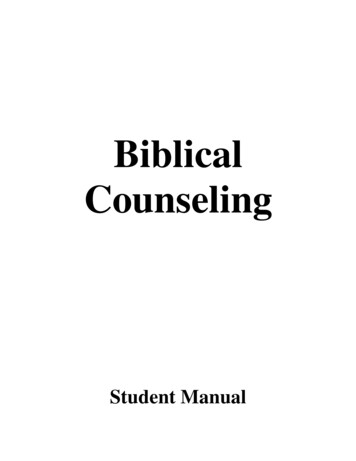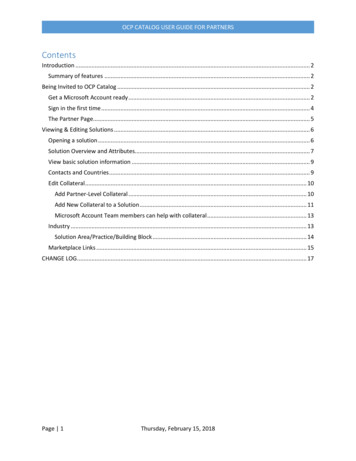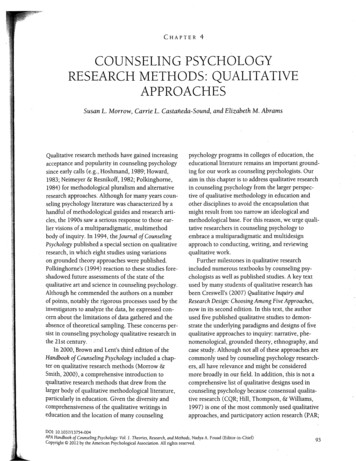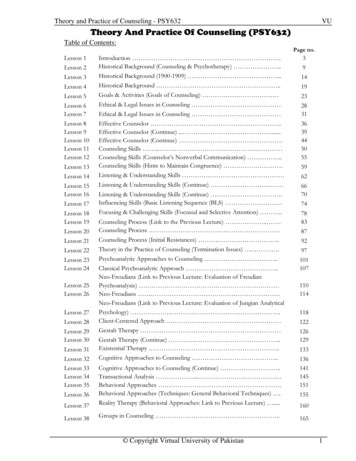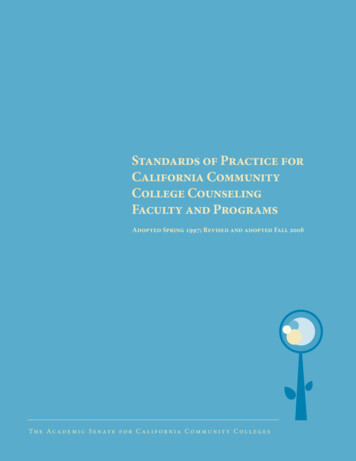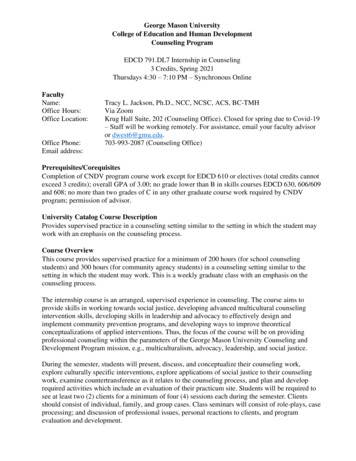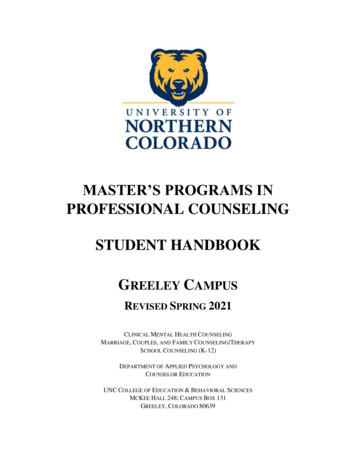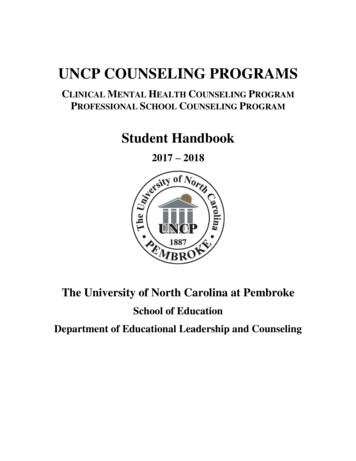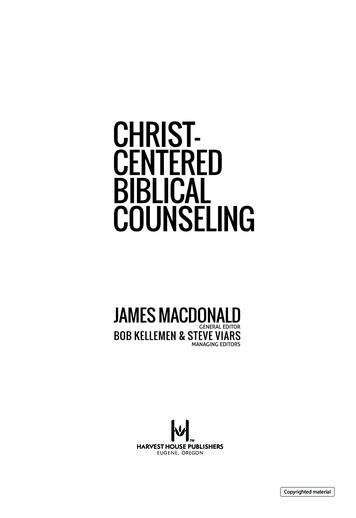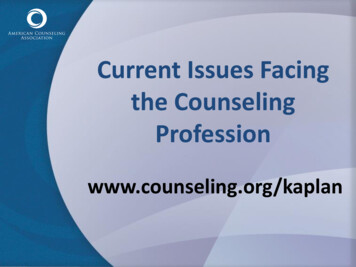
Transcription
Current Issues Facingthe CounselingProfessionwww.counseling.org/kaplan
David KaplanACA Chief Professional Officerdkaplan@counseling.org2016 LCA conference
Two Game-Changing Issues External to the profession Internal to the profession
External to the ProfessionCODIFIEDLGBTDISCRIMINATION
LGBT Societal Advances Sex Adoption Same-sex marriage A start to transgender acceptance
And in our world .Condemnation ofconversion therapy
180 Backlashes Anti-transgender legislation Pro conversion therapylegislation Religious refusal legislation
Tennessee Legislation offered that allowed LPCs todeny services to clients based on “sincerelyheld principles” of the LPC, in violation ofthe ACA Code of Ethics. Stripped the power of the State board tosanction LPCs. Passed as part of an effort to attack theACA and counseling profession.
No counselor providingcounseling or therapy servicesshall be required to counsel orserve a client as to goals,outcomes, or behaviors thatconflict with the sincerely heldprinciples of the counselor
Internal to the ProfessionPATHWAYS TOPROFESSIONALISM
Pathways to ProfessionalismLICENSURE
Pathways to ProfessionalismINITIAL LICENSURE
A movement toward CACREP Beginning in 2018- a degree from aCACREP accredited school is requiredto obtain a license in Ohio. Kentucky, New Hampshire, and NorthCarolina have also introduced CACREPrequirements.
Delaware now requires the NCC forboth initial and reciprocal licensure– a de facto CACREP requirement. The Virginia Board recently voted toapprove a CACREP degree forlicensure.
On the other hand . New Jersey is proposing to remove thelicensure requirement that a degreecontains the word “counselor” or“counseling”.
ACA’s answer is tomove forwardtogether
Moving forward .To unify the profession, ACAendorses graduation from aCACREP/CORE accredited programas the pathway to licensure.
Together .ACA advocates that all counselorslicensed by July, 2020 are qualifiedto have the same options andprivileges as graduates fromCACREP and CORE programs.
Pathways to ProfessionalismLICENSURERECIPROCITY
Current Approaches to Licensure nbcc.orgAASCB20/20 icensure titleLicensed ProfessionalCounselor (LPC)Licensure scope ofpracticeSee 3 belowRequired years ofPractice0Required exam(s)noneRequired training/Certificationnone25NCE or NCMHCEState jurisprudence examis optionalGraduation from a clinicallyfocused CACREP accreditedprogram or certification asan NCC
1THE AMERICAN COUNSELING ASSOCIATIONLicensure Portability ModelWhereas the mission statement of the American Counseling Association is to enhancethe quality of life in society by promoting the development of professional counselors,advancing the counseling profession, and using the profession and practice ofcounseling to promote respect for human dignity and diversity; andWhereas advocating for licensure portability that allows professional counselorslicensed at the independent practice level in one state to have the mobility to utilizetheir education and training and to serve the public by becoming licensed at theindependent practice level in another state supports the mission of the AmericanCounseling Association;Therefore, the American Counseling Association promulgates the following licensureportability model:A counselor who is licensed at the independent practice level in their home state andwho has no disciplinary record shall be eligible for licensure at the independentpractice level in any state or U.S. jurisdiction in which they are seeking residence. Thestate to which the licensed counselor is moving may require a jurisprudenceexamination based on the rules and procedures of that state.
2The Building Blocks to Portability Project from the 20 /20: A Vision for the Future ofCounseling profession-wide initiative.3The independent practice of counseling encompasses the provision of professionalcounseling services to individuals, groups, families, couples and organizations throughthe application of accepted and established mental health counseling principles,methods, procedures and ethics. Counseling promotes mental health wellness, whichincludes the achievement of social, career, and emotional development across thelifespan, as well as preventing and treating mental disorders and providing crisisintervention. Counseling includes, but is not limited to, psychotherapy, diagnosis,evaluation; administration of assessments, tests and appraisals; referral; and theestablishment of counseling plans for the treatment of individuals, couples, groupsand families with emotional, mental, addiction and physical disorders. Counselingencompasses consultation and program evaluation, program administration withinand to schools and organizations, and training and supervision of interns, trainees,and pre-licensed professional counselors through accepted and established principles,methods, procedures, and ethics of counselor supervision. The practice of counselingdoes not include functions or practices that are not within the professional’s trainingor education.
How ACA can help you keep upwith current national issues ACA ConnectRead Counseling TodayRead CT online www.ct.counseling.orgRead ACA e-NewsSubscribe to the ACA blogs www.my.counseling.orgSubscribe to the ACA government affairsnewsletter: dharp@counseling.org
Visit the ACA Facebook page Follow ACA on Twitterhttps://twitter.com/#!/CounselingViews Subscribe to counseling listservs (cesnet,counsgrads, icn, etc.) Use Google alerts Ask David
Let’s schmooze!
Current Issues Facingthe CounselingProfessionwww.counseling.org/kaplan
2 The Building Blocks to Portability Project from the 20 /20: A Vision for the Future of Counseling profession -wide initiative. 3 The independent practice of counseling encompasses the provision of professional counseling servic es to individuals, groups, families, couples and organizations through the application of accepted and established mental health counseling principles,
